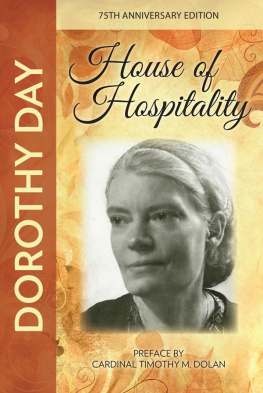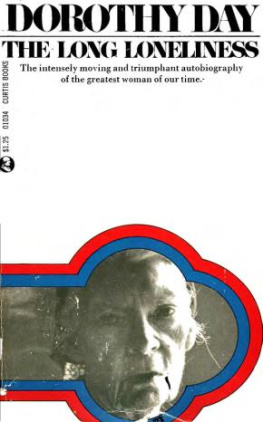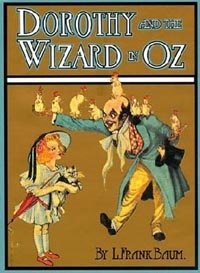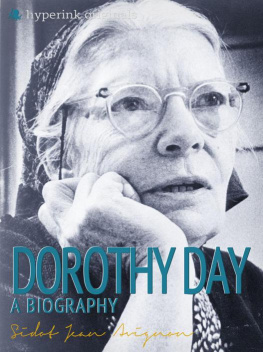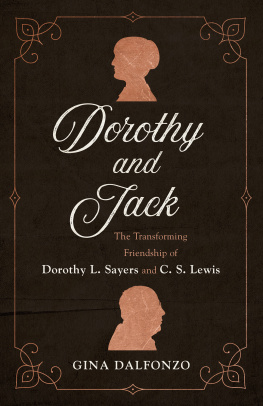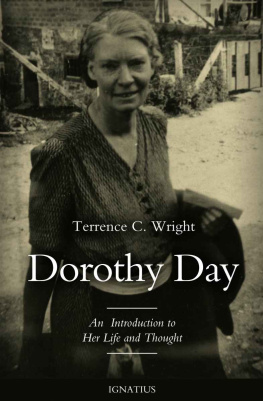Dorothy Day - House of Hospitality
Here you can read online Dorothy Day - House of Hospitality full text of the book (entire story) in english for free. Download pdf and epub, get meaning, cover and reviews about this ebook. year: 1939, publisher: Sheed and Ward, genre: Detective and thriller. Description of the work, (preface) as well as reviews are available. Best literature library LitArk.com created for fans of good reading and offers a wide selection of genres:
Romance novel
Science fiction
Adventure
Detective
Science
History
Home and family
Prose
Art
Politics
Computer
Non-fiction
Religion
Business
Children
Humor
Choose a favorite category and find really read worthwhile books. Enjoy immersion in the world of imagination, feel the emotions of the characters or learn something new for yourself, make an fascinating discovery.
- Book:House of Hospitality
- Author:
- Publisher:Sheed and Ward
- Genre:
- Year:1939
- Rating:4 / 5
- Favourites:Add to favourites
- Your mark:
- 80
- 1
- 2
- 3
- 4
- 5
House of Hospitality: summary, description and annotation
We offer to read an annotation, description, summary or preface (depends on what the author of the book "House of Hospitality" wrote himself). If you haven't found the necessary information about the book — write in the comments, we will try to find it.
Dorothy Day: author's other books
Who wrote House of Hospitality? Find out the surname, the name of the author of the book and a list of all author's works by series.
House of Hospitality — read online for free the complete book (whole text) full work
Below is the text of the book, divided by pages. System saving the place of the last page read, allows you to conveniently read the book "House of Hospitality" online for free, without having to search again every time where you left off. Put a bookmark, and you can go to the page where you finished reading at any time.
Font size:
Interval:
Bookmark:
House of Hospitality
House of Hospitality
BY DOROTHY DAY
Our Sunday Visitor Publishing Division
Our Sunday Visitor, Inc.
Huntington, Indiana 46750
Every reasonable effort has been made to determine copyright holders of excerpted materials and to secure permissions as needed. If any copyrighted materials have been inadvertently used in this work without proper credit being given in one form or another, please notify Our Sunday Visitor in writing so that future printings of this work may be corrected accordingly.
Text of House of Hospitality by Dorothy Day originally published in 1939 by Sheed & Ward, Inc. All additional texts in this edition including the Preface, the Introduction, the footnotes, and For Further Reading copyright 2015 by Our Sunday Visitor Publishing Division, Our Sunday Visitor, Inc. Published 2015.
20 19 18 17 16 15 1 2 3 4 5 6 7 8 9
All rights reserved. With the exception of short excerpts for critical reviews, no part of this work may be reproduced or transmitted in any form or by any means whatsoever without permission in writing from the publisher. Contact: Our Sunday Visitor Publishing Division, Our Sunday Visitor, Inc., 200 Noll Plaza, Huntington, IN 46750; 1-800-348-2440; .
ISBN: 978-1-61278-815-9 (Inventory No. T1621)
eISBN: 978-1-61278-375-8
LCCN: 2014952457
Cover design: Amanda Falk
Cover art: Photo of Dorothy Day courtesy of the Department of Special Collections and University Archives, Marquette University Libraries. Background image courtesy of Shutterstock.
P RINTED IN THE U NITED S TATES OF A MERICA
Table of Contents
by Cardinal Timothy M. Dolan
by Lance Byron Richey


Preface
Heartfelt thanks to Our Sunday Visitor for bringing back into print Dorothy Days House of Hospitality. Originally published in 1939, House of Hospitality recounts the early days of the Catholic Worker movement, founded by Peter Maurin and Dorothy. This republication is particularly timely, coinciding as it does with the Churchs efforts toward a New Evangelization and with Pope Francis emphasis on the works of mercy, justice, and care for the poor. It also provides further support for our ongoing efforts to have her canonized as a saint.
The life and work of Dorothy Day provide an excellent source for a renewed sense of commitment to the Gospel and our Christ-centered faith, both for those who continue to practice the faith and for those who may have left or drifted away. House of Hospitality contains the seeds of her authentic understanding of the Gospel and the role of the Church in the world that will be more fully articulated in her later works. Dorothy Days faith always radiates out from the person of Christ, through participation in the Church through word and sacrament, to formation of a community that is open and ready to serve all who come, especially those most in need.
It is difficult to read the book without marveling at the movement of the Spirit in the comings and goings of people; the struggles to sustain the food lines, shelter, farm, and newspaper; and in their strivings for social change. Trust in divine Providence and openness to the gift of every moment even in the midst of loneliness, sadness, vulnerability, and self-doubt miraculously mark these early days of the movement.
Examining how we live morally is fundamental to the renewal of our faith. Love of God was never an abstract ideal for Dorothy, but was inseparable from love of neighbor and the spiritual and corporal works of mercy. Welcome and hospitality, all the imperatives of the Sermon on the Mount, were central to her, not just the prerogative of saints but a call directed at every Christian. Although these early days are filled with the presence of nuns, priests, believers, unbelievers, servers, and served (even bishops), she exemplified the apostolate of the laity.
Pope Francis has exhorted the Church to be poor and for the poor. Dorothy Day believed in and labored for such a Church. Her experience of life in God was inseparable from her choice of a life of voluntary poverty, of living with the poor, and of accepting each person for who they are, being a loving presence for the life and human dignity for which God created us, and seeing the face of Christ in all who come to the door.
In the early 1990s, my predecessor, Cardinal John OConnor, after careful consultation with those who knew and worked with her, initiated her cause for canonization. We believe she is a saint for our time. As a layperson, a woman, a single mother, a model of devotion to the Church and her saints, and with her commitments to peace, justice, life, and the works of mercy, she is an inspiration for all of us who, like her, face contemporary national and international trials of war, injustice, racism, abortion, and social, political, and economic challenges. Dorothy Day can help us transcend superficial labels of left and right, liberal and conservative, more government or less. She can help us return to the mercy and forgiveness of Christ, our beginning and end, the wellspring from which we can create, as Peter Maurin said, a society where it is easier to be good.
Near the end of chapter ten, Dorothy describes walking by a group of unemployed men who are lined up to receive breakfast provided by the Worker. She finds it difficult to even speak to them, seeing the depth of their patient misery and despair. Rather she would take their hands, and pray:
Forgive us let us forgive each other! All of us who are more comfortable, who have a place to sleep, three meals a day, work to do we are responsible for your condition. We are guilty of each others sins. We must bear each others burdens. Forgive us and may God forgive us all!
We need her for our Church. We need her for our time. We need her for each other.
C ARDINAL T IMOTHY M. D OLAN
Archbishop of New York
September 5, 2014
Feast of Blessed Mother Teresa
Introduction
House of Hospitality: Discovering the Downward Path of Salvation
By Lance Byron Richey
During the summer of 1939, while the world drifted towards the catastrophe of total war, Dorothy Days diaries are almost silent, and the handful of entries remarkably mundane. Her normal routine of travel and speaking. The difficulties and occasional drunkenness of her companions at the Catholic Worker house. A short meditation on the nature of sin. Then, almost in passing, she mentions on July 30 that she has been working all month at the proofs of the new book and a last chapter. She obviously completed her work, since House of Hospitality was published in August, only days before the outbreak of the Second World War.
House of Hospitality is in many respects only a first draft of Days account of her initial encounter with Peter Maurin in 1933 and the early experiences of the Catholic Worker movement they founded, which would find mature expression more than a decade later in her masterpiece of spiritual autobiography, The Long Loneliness. But here the style of writing is highly journalistic, the structure amorphous and only generally chronological, and the subject matter quotidian (for Day and her companions, at least). As Day explains: The following pages are jottings written down during journeys, notes kept for my own comfort, information, clarification, or publication. A great many of these notes were not written for publication, but for my own self in moments of trouble and in moments of peace and joy (p. 48).
The occasional character of the material and the lack of any narrative unity (or even a discernible structure) is painfully apparent throughout the work. Despite its literary shortcomings, Day defends the value of the book as a historical document: Some will think, perhaps, that it is premature to present this sketchy material on the movement that the
Next pageFont size:
Interval:
Bookmark:
Similar books «House of Hospitality»
Look at similar books to House of Hospitality. We have selected literature similar in name and meaning in the hope of providing readers with more options to find new, interesting, not yet read works.
Discussion, reviews of the book House of Hospitality and just readers' own opinions. Leave your comments, write what you think about the work, its meaning or the main characters. Specify what exactly you liked and what you didn't like, and why you think so.

